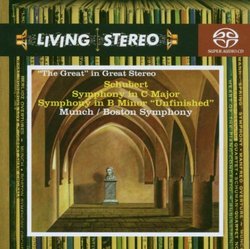| All Artists: Franz [Vienna] Schubert, Charles Münch, Boston Symphony Orchestra Title: Schubert: Symphonies Nos. 8 & 9 Members Wishing: 1 Total Copies: 0 Label: RCA Original Release Date: 1/1/2007 Re-Release Date: 1/23/2007 Album Type: Hybrid SACD - DSD, Original recording remastered Genre: Classical Styles: Historical Periods, Classical (c.1770-1830), Symphonies Number of Discs: 1 SwapaCD Credits: 1 UPC: 886970460323 |
Search - Franz [Vienna] Schubert, Charles Münch, Boston Symphony Orchestra :: Schubert: Symphonies Nos. 8 & 9
 | Franz [Vienna] Schubert, Charles Münch, Boston Symphony Orchestra Schubert: Symphonies Nos. 8 & 9 Genre: Classical
|
Larger Image |
CD Details |
CD ReviewsExuberant Schubert from Munch & the Bostonians... Hank Drake | Cleveland, OH United States | 02/10/2007 (5 out of 5 stars) "Many years ago, before the era of the Compact Disc, I uncovered a monaural LP of Schubert's "Great" C major Symphony in my grandmother's basement, featuring the Boston Symphony Orchestra under Charles Munch. Playing it, I was immediately captivated by the vibrant and exuberant performance of a work I was only beginning to know. Little did I know back then that the recording had actually been part of RCA's legendary Living Stereo series, and would be reissued many years later in superb three channel sound. Munch's conception of the C major Symphony is similar to Toscanini's 1953 recording: the first movement is played with little tempo fluctuation; the second movement is an Andante rather than a quasi-Adagio; the final movements are rollicking. In addition, repeats are not observed. But numerous details are different, including forward winds and brass, and less prominent strings. Munch gets a mellow tone from his orchestra, until he lets the brass blast forth at climaxes. In short, this is the polar opposite of the Gemutlikeit style favored in many performances. The "Unfinished" is given a more relaxed, darker performance. When the major theme appears in the first movement, it's an optimistic interlude rather than the focus. The tranquil second movement features especially fine woodwind playing. This symphony is recorded in 2-channel stereo. Sony/BMG's reissue features the original cover art and liner notes. The refurbished sonics are nearly, but not quite, at the level of the latest digital recordings. Highly recommended. " Good Schubert in Great Sound Michael B. Richman | Portland, Maine USA | 02/09/2007 (4 out of 5 stars) "Charles Munch and the Boston Symphony Orchestra gave us many of the all-time great recordings in the French fare. Their classic performances of Saint-Saens' Organ Symphony, Berlioz's Symhponie Fantastique, Debussy's La Mer and Franck's Symphony still set the standard, for many people, more than fifty years later. However, when it came to the German Romantics, Munch and the Bostonians often left much to be desired. The spirit and spontaneity that made the French works so great didn't generally translate as well with Beethoven, Mendelssohn and Schubert. All three recent "Living Stereo" SACD Hybrid reissues -- Beethoven: Symphonies Nos. 5 & 6 "Pastoral" [Hybrid SACD], Mendelssohn: Italian & Reformation Symphonies [Hybrid SACD], and this one featuring Schubert's Unfinished and Great -- all have remarkably better sound than their RCA "Basic 100" series predecessors, but that is not enough for me to recommend them unequivocally. Unfortunately, other great golden age stereo recordings of Schubert's 8th & 9th are currently out-of-print, and hopefully are awaiting a similar remastering. So until the Szell gets repackaged into Sony's "Great Performances" series and the Krips into Decca/UNI's expanded "Originals" series, the Munch may have to do. Of course, Leonard Bernstein is also excellent in this material (Schubert: Symphonies Nos. 8 "Unfinished" & 9 "The Great"), and if you can stand mono, Furtwangler's recording of the 9th (Schubert: Symphony No. 9; Haydn: Symphony No. 88 / Furtwängler) is unparalleled." Wonderful Schubert performances L. Johan Mod�e | Earth | 02/28/2007 (5 out of 5 stars) "This recording incarnates one of the two most famous Charles Munch and Boston Symphony Orchestra collaborations that we have in record history: Schubert's "Unfinished" and "Great". As is the case with the other recording - Saint-Saëns' third symphony, "Organ" - the present recording has preserved one of those rare moments of music making when power, passion and structure are in perfect balance.
Munch's interpretations are swift, but not too fast. Szell's interpretation of the "Unfinished" is for instance faster than Munch's. And if we consider timings for the "Great", Furtwängler's is here among the slowest ones on disc (but what a great recording this is!) while Munch is much faster. But he's not as fast as Szell in the two last movements. These timings tell us very little about the outstanding quality of all these great recordings, however. I urge Schubert fans to have them all. But Munch's moving, powerful, and hauntingly beautiful interpretations are second to none, and the performance of Boston Symphony Orchestra has few rivals here. Sound is first rate as well. As a legendary, classic recording it has a given place in every collection. Warmly recommended." |

 Track Listings (18) - Disc #1
Track Listings (18) - Disc #1